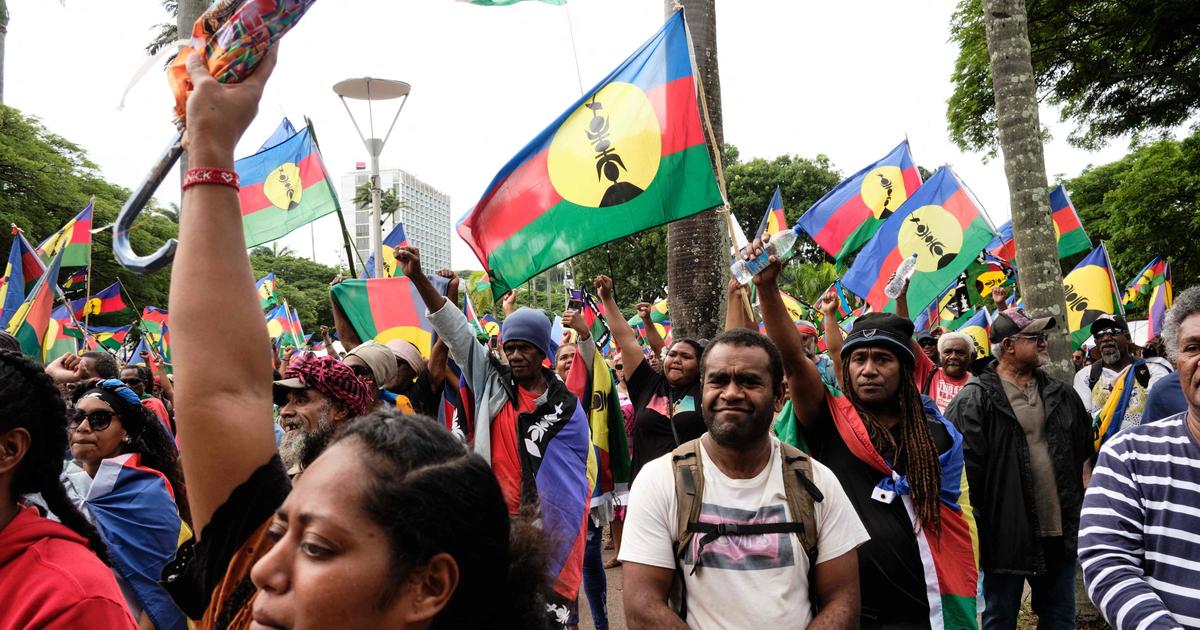Two separate demonstrations, on a scale not seen since the 1980s, brought together in Nouméa independentists on one side, non-independentists on the other, all mobilized on the question of expanding the electorate in view of the next provincial elections in New Caledonia.
These mobilizations aimed to demand the withdrawal of the constitutional bill providing for the unfreezing of the electorate for the provincial elections on the pro-independence side and to support it for the non-independence parties.
Official figures from the High Commission of the Republic, given at the end of the afternoon, estimated the total number of demonstrators at some 40,000 for a total population of 269,000 inhabitants: 20,000 for the separatists and the same number for the non-separatists. Figures clearly below the counts of each of the organizations which give a participation of 58,000 demonstrators for the separatists, 35,000 for the non-separatists.
“Paris, hear us!”
The demonstrators found themselves in the city center of Nouméa, separated by the police.
“Paris, hear us!”
, chanted in front of an essentially European crowd Sonia Backès, the loyalist leader, at the initiative of this mobilization with the Rassemblement-LR (right) to show her attachment to France and the opening of the electorate.
The procession made a loop to the sound of the Marseillaise and the rhythm of the slogans:
“We are at home!”
or even:
“Proud to be Caledonians, proud to be French!”
.
“This is not an action against the Kanak people but it is not normal that we do not have this citizen right. It’s an aberration that we don’t have the same rights as elsewhere in the Republic!”
, Bertrand, a 67-year-old demonstrator living in New Caledonia for three months, told AFP, who wished to remain anonymous.
“This is France. (...) I am here because I want all people to be able to vote at home,”
declared Guillaume, also on condition of anonymity, 17 years old, resident of Koumac, in the north of Grande-Terre.
“Peace is threatened because the State has gone beyond its impartiality. (...) The thawing of the electorate leads us to death
,” said Roch Wamytan, one of the leaders of the Caledonian Union, the main independence party of the Kanak and Socialist National Liberation Front.
Tense context between supporters and opponents of independence
These demonstrations of force come in a context of strong tensions between supporters and opponents of the independence of the archipelago whose political leaders are struggling to dialogue to agree on a new status, after the holding of three self-determination referendums.
The last demonstrations of this scale date back to the 1980s, a decade marked by a quasi-civil war. In May 1983, the arrival of Secretary of State for the French Overseas Territories Georges Lemoine brought more than 30,000 people into the streets of Nouméa. Since then, the demonstrations have very exceptionally reached 25,000 people.
The partial unfreezing of the electorate provided for by the constitutional bill carried by Gérald Darmanin, the Minister of the Interior and Overseas Territories, and adopted by the Senate on April 2, could call into question the political balance between independence and non-independence. -independence, defined by the Nouméa Accord passed in 1998. The provincial elections determine the representation of the parties in the Congress of New Caledonia, the deliberative body of the territory.
The bill must be examined in May by the National Assembly. It aims to open the electorate in provincial elections to people who have resided in New Caledonia for at least ten years.
According to the Senate report, this thaw would increase the composition of the electoral body by 14.5%, adding 12,441 natives of New Caledonia, as well as 13,400 French citizens present continuously for at least ten years.
For the separatists, this thaw
"decided unilaterally",
breaks with the
"fundamental rules which established peace in this country
", as recalled this week in a press release Dominique Fochi, the secretary general of the Caledonian Union .

